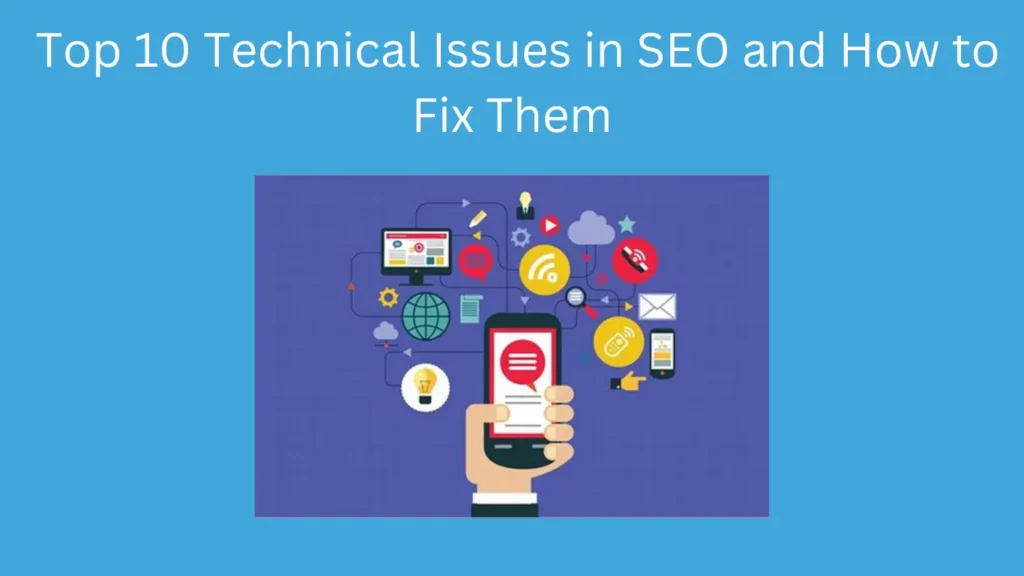Introduction
Search Engine Optimization (SEO) is a crucial aspect of digital marketing, and mastering its technical aspects is essential for achieving online success. However, many websites face technical issues that can hinder their SEO performance. In this blog post, we’ll explore the top 10 technical issues in SEO and provide actionable solutions to fix them.
Crawl Errors
- Issue: Search engines may encounter difficulties crawling your site, leading to indexing issues.
- Solution: Regularly check Google Search Console for crawl errors. Fix broken links, update sitemaps, and ensure proper redirects to resolve crawl issues.
Page Speed
- Issue: Slow-loading pages can negatively impact user experience and search rankings.
- Solution: Optimize images, leverage browser caching, and minimize server response time. Consider using a Content Delivery Network (CDN) to enhance page loading speed.
Mobile Responsiveness
- Issue: With the rise of mobile users, a non-responsive website can lead to poor rankings.
- Solution: Implement a responsive design that adapts to various screen sizes. Google prioritizes mobile-friendly sites, so ensure your mobile version provides an excellent user experience.
SSL Certificate Issues
- Issue: Lack of an SSL certificate can result in a “Not Secure” warning, affecting user trust and SEO.
- Solution: Install an SSL certificate to secure your website. This not only improves user confidence but is also a ranking factor for Google.
Duplicate Content
- Issue: Duplicate content can confuse search engines and dilute the authority of your pages.
- Solution: Regularly audit your content for duplicates and use canonical tags to indicate the preferred version. Implement 301 redirects for pages with similar content.
URL Structure
- Issue: Poorly structured URLs can make it challenging for search engines to understand your content.
- Solution: Use descriptive and concise URLs. Include relevant keywords, and avoid using unnecessary parameters. A clean URL structure improves user experience and SEO.
Meta Tags and Descriptions
- Issue: Missing or poorly optimized meta tags can impact click-through rates and search rankings.
- Solution: Ensure each page has a unique and compelling meta title and description. Include relevant keywords while maintaining a natural flow to encourage clicks.
Broken Links
- Issue: Broken links can harm user experience and contribute to a negative SEO impact.
- Solution: Regularly check for broken links and fix them promptly. Use tools like Google Search Console or third-party tools to identify and address broken links across your site.
Structured Data Markup
- Issue: Lack of structured data can limit your site’s visibility in rich snippets and other SERP features.
- Solution: Implement schema markup to provide search engines with additional context about your content. This can enhance your chances of appearing in rich results.
Robots.txt and XML Sitemap Issues
- Issue: Incorrectly configured robots.txt or missing XML sitemap can hinder search engines’ ability to crawl and index your site effectively.
- Solution: Review and update your robots.txt file to ensure it allows access to relevant content. Additionally, submit an updated XML sitemap to Google Search Console to facilitate proper indexing.
Conclusion
Addressing technical SEO issues is crucial for optimizing your website’s performance and enhancing its visibility on search engines. Regular monitoring, audits, and timely fixes can significantly improve your site’s overall SEO health. By implementing the solutions outlined above, you’ll be better equipped to tackle these technical challenges and pave the way for improved search rankings and user experience.
For further Inquires Contact Us
FAQs
Q: Why is page speed important for SEO?
A: Page speed directly influences user experience and is a crucial factor in Google’s ranking algorithm. Faster-loading pages contribute to higher search rankings and improved user satisfaction.
Q: What is the significance of mobile responsiveness in SEO?
A: Mobile responsiveness is vital because Google prioritizes mobile-friendly sites. With a growing number of mobile users, a responsive design ensures a positive user experience, contributing to better SEO performance.
Q: How can SSL certificates impact SEO?
A: SSL certificates enhance website security and trust. Google considers SSL as a ranking factor, and websites with HTTPS receive a ranking boost. It also ensures a secure connection for users, reinforcing their confidence in your site.
Q: How does structured data markup benefit SEO?
A: Structured data markup, implemented through schema.org, provides search engines with additional context about your content. This can lead to enhanced visibility in rich snippets and other SERP features, positively impacting SEO.
Q: Why is a clean URL structure important for SEO?
A: A well-structured URL makes it easier for search engines to understand your content. Descriptive URLs with relevant keywords contribute to a better user experience and can positively influence search rankings.

